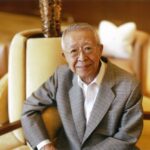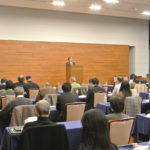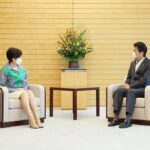A symposium titled “Democracy in the Global Age” was held at the Iwasaki Koyata Memorial Hall, International House of Japan, on December 14, 2017, under the joint sponsorship of the Shibusawa Eiichi Memorial Foundation, the International House of Japan and the Suntory Foundation.

Tanaka Aiji (left), professor at Waseda University, opens the “Democracy in the Global Age” symposium at the International House of Japan, Tokyo.
JAPAN JOURNAL PHOTO
The view that a range of problems may not be solved through democratic elections in ways that reflect the needs of voters has spread among people living in liberal democracies in recent years. The legitimacy of the democratic system was discussed at this symposium based on introduced cases in countries such as the United States, South Korea and Japan.
At the beginning of the symposium, which was chaired by Tanaka Aiji, professor at Waseda University, Melissa S. Williams, professor at the University of Toronto, delivered a keynote speech titled Democratic Legitimacy and its Alternative. Three panelists – Kim Youngmin, professor at Seoul National University, Ishikawa Ryoko, associate professor at Ritsumeikan University, and Machidori Satoshi, professor at Kyoto University – contributed comments following the keynote speech. The five participants, comprising the above three, Tanaka and Williams, held a panel discussion at the end of the symposium.
Keynote Speech

Melissa S. Williams, professor at the University of Toronto, delivers the keynote speech.
JAPAN JOURNAL PHOTO
The keynote speaker at the symposium, Professor Williams from the Department of Political Science at the University of Toronto (U of T), established the Center of Ethics at U of T in 2005 and acted as its founding director until 2010. With the assistance of the Shibusawa Eiichi Memorial Foundation, Professor Williams took part in an international joint research project on political legitimacy in East Asia with Joseph Chan, professor at the University of Hong Kong, and Doh Chull Shin, Scholar-in-Residence at the University of California, Irvine. Cambridge University Press published East Asian Perspectives on Political Legitimacy: Bridging the Empirical-Normative Divide, a summary of the outcome of this project, in 2016. In this book, researchers from China, South Korea, Hong Kong, Singapore, Taiwan, the United States, Canada and the UK analyze political legitimacy in East Asia using approaches that are not bound by conventional Western political theories. Based on the outcome of this project, Professor Williams delivered her keynote speech on the characteristics of political legitimacy in East Asia and populism that is currently spreading all over the world.
Professor Williams stated that political legitimacy in East Asia is Minben legitimacy, which is a type of legitimacy that reflects the concept of Minben (people as root) in Confucianism. Democratic legitimacy emphasizes the attitude and preferences of the citizens. For this reason, it is more society-centered, and has greater interest in controlling the power of states. In the meantime, Minben legitimacy stresses states as agents that have the capacity to produce public welfare. According to Professor Williams, Minben legitimacy and democracy are compatible in East Asia, and legitimacy is a hybrid phenomenon. Professor Williams stated that citizens think about political legitimacy in diverse ways, and that the compatibility between Minben legitimacy and democracy is not necessarily paradoxical.
Professor Williams also explained why populist nationalism is jeopardizing democratic legitimacy in many democracies at present. Professor Williams identified two problems with democracy that worsened with the intensification of globalization. One is stasis or political paralysis. This problem is arising as globalization complicates domestic problems, and it gives rise to conflicts of interest and makes it hard for governments to take resolute actions. Inequality and the declining middle class are the other problem. The shift of employment from high-wage nations to low-wage ones due to globalization and the loss of manpower demand as a result of technological changes are destabilizing the middle class economically. Professor Williams pointed out that these problems are causing populism to gather strength.
However, Professor Williams stated that democracy has opportunities to stay alive and grow even stronger in spite of the crises it faces. At the end of her keynote speech, Professor Williams noted there is no single magic bullet for the incompetence of democracy. Professor Williams wrapped up her keynote speech, saying that there is a lot of drilling to do for people who believe in democracy, as Max Weber noted with his expression, “politics is a strong and slow drilling of hard boards.”
Panelists’ Comments
Three panelists provided their comments after the keynote speech.
Kim Youngmin, professor, Seoul National University

Kim Youngmin, professor at Seoul National University
JAPAN JOURNAL PHOTO
Kim Youngmin commented on political legitimacy in South Korea, citing the change of government from former President Park Geun-hye to President Moon Jae-in as an example. In South Korea, massive demonstrations calling for the resignation of former President Park were held by citizens when suspected national administration interventions by a friend of Park came to light in 2016. Park was impeached by the National Assembly and lost her job. According to Professor Kim, those affairs reaffirmed democracy and affirmed the rule of law in South Korea. As a matter of fact, citizens have played the role of checking power for many years in South Korea. Professor Kim stated that how citizens would build more effective relations with the legislative branch of government would be an issue from now on because such direct democracy through demonstrations is costly and unsustainable.
According to Professor Kim, the administrative approach taken by former President Park resembled that of her father, former President Park Chung-hee, who modernized the South Korean economy under an authoritarian regime. Former President Park Geun-hye attempted to gain legitimacy by applying the charisma of her father, who had won legitimacy by bringing economic affluence to South Korea. Like her father, however, former President Park is said to have become high-handed for maintaining legitimacy when she began to lose power. Economic prosperity is not sufficient to satisfy political legitimacy in South Korea today. Professor Kim pointed out that the Moon Jae-in administration also runs the risk of losing its legitimacy unless it can maintain a certain level of economic prosperity.
Ishikawa Ryoko, associate professor, Ritsumeikan University

Ishikawa Ryoko, associate professor at Ritsumeikan University
JAPAN JOURNAL PHOTO
Ishikawa Ryoko gave high ratings to the aforementioned East Asian Perspectives on Political Legitimacy: Bridging the Empirical-Normative Divide, calling it a book in which the authors sought to build a bridge between the West and Asia through a concept called political legitimacy. Political science theories have been built on the basis of Western traditions and history. Associate Professor Ishikawa stated that this book raised an objection to the application of Western-oriented theories to East Asia and showed the way legitimacy could be outside the tradition of Western philosophy.
In addition, Ishikawa pointed out a problem in connection with democracy in the global era, arguing that the institution called democracy has not become globalized despite transborder movements of people and goods. Various problems, such as environmental issues, the exhaustion of natural resources, terrorism and infectious diseases, are currently becoming globalized on Earth. However, democracy has been practiced within the framework of states only. Democracy has not been able to deal sufficiently with these globalizing risks. Associate Professor Ishikawa stated that this condition might be one of the causes of the distrust that people are beginning to have for existing democratic institutions.
Machidori Satoshi, professor, Kyoto University

Machidori Satoshi, professor at Kyoto University
JAPAN JOURNAL PHOTO
Based on his position that populism is the most important risk for democracy in the global age, Machidori Satoshi pointed out the need to examine two points. A brush up of representative democracy is the first point. Populism expands as a new political party under a charismatic leader gains huge support in a short period of time when people are unable to perceive affluence personally. Professor Machidori argued that institutional reforms that change competition among political parties can control its expansion to a certain extent.
The development of an institution that makes representative democracy and direct democracy genuinely complementary to each other is the second point. Professor Machidori stated that the institutionalization of deliberative democracy and its integration into representative democracy are essential for developing such an institution. He cited deliberation through political parties as a pathway for this institutionalization and integration. Such deliberation means that more people join the exchanges of information and opinions on policy issues in political parties. In other words, political parties play the role of forums for voters. Professor Machidori stated that such deliberation has the possibility of enhancing the legitimacy of representative democracy.
Panel Discussion
In the panel discussion that followed Professor Machidori’s comments, the participants discussed the realization of better democracy, particularly the potential of deliberative democracy, in a lively manner. According to Professor Williams, there are several good models for deliberative democracy, such as the election system reforms in British Columbia, Canada. Professor Williams stated that people living in liberal democracies still have a lot to learn regarding how to combine deliberative institutions with electoral institutions.
By SAWAJI Osamu, The Japan Journal








